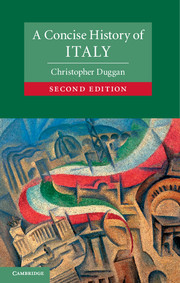Book contents
- Frontmatter
- Contents
- List of Illustrations
- List of Maps
- List of Tables
- Preface
- Chronology
- Introduction
- 1 The geographical determinants of disunity
- 2 Disunity and conflict: from the Romans to the Renaissance, 400–1494
- 3 Stagnation and reform, 1494–1789
- 4 The emergence of the national question, 1789–1849
- 5 Italy united
- 6 The liberal state and the social question, 1870–1900
- 7 Giolitti, the First World War, and the rise of Fascism
- 8 Fascism
- 9 The Republic
- Bibliographical essay
- Index
9 - The Republic
Published online by Cambridge University Press: 05 June 2014
- Frontmatter
- Contents
- List of Illustrations
- List of Maps
- List of Tables
- Preface
- Chronology
- Introduction
- 1 The geographical determinants of disunity
- 2 Disunity and conflict: from the Romans to the Renaissance, 400–1494
- 3 Stagnation and reform, 1494–1789
- 4 The emergence of the national question, 1789–1849
- 5 Italy united
- 6 The liberal state and the social question, 1870–1900
- 7 Giolitti, the First World War, and the rise of Fascism
- 8 Fascism
- 9 The Republic
- Bibliographical essay
- Index
Summary
The Resistance, 1943–1945
The fall of Mussolini was met with enthusiasm and a widespread feeling that the war would soon be over. When Pietro Badoglio, the new prime minister, announced that fighting continued, few, not even himself, believed it. The government’s aim was to humour the Germans until an armistice had been signed quickly change sides, and then, with Allied help, seize Rome. But there were delays and no proper plans were made to prepare the army for what was about to take place (Badoglio and the king were terrified of the Germans – who already deeply mistrusted the Italians). By the time an armistice was signed on 3 September the Germans were pouring reinforcements into the peninsula. Besides, the Italian army had no real stomach for a fight, on whoever’s side; and although it had been agreed that Italian troops would aid an American offensive to capture Rome, in the event no support was forthcoming. Without any orders from above, the Italian forces simply dissolved, leaving the Germans free to secure all of northern and central Italy.
This left Italy divided. The king and his government fled Rome to escape the nazis, and set up residence in Brindisi: an act easily construed as cowardice, which sealed the fate of the monarchy in 1946. Meanwhile the Germans had seized Mussolini from his prison on the Gran Sasso mountain, taken him up north, and installed him at the head of a puppet government on the shores of Lake Garda. The Republic of Salò, as this last incarnation of fascism was called, was notable for the brutality of its various police forces (some of them just private criminal gangs) and for attempts to resurrect the syndicalist elements of the early movement: a law of 1944, for instance, declared that half of the management board of large firms should consist of representatives elected by the workers.
- Type
- Chapter
- Information
- A Concise History of Italy , pp. 242 - 306Publisher: Cambridge University PressPrint publication year: 2013



